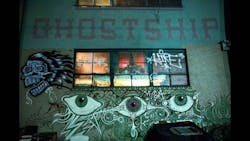Oakland FF Who Toured Ghost Ship Saw 'High Fire Load'
Dec. 13--One of four Oakland firefighters who walked through the Ghost Ship warehouse two years before a fire there killed 36 people testified Tuesday.
Oakland Fire Captain George Freelen said he became concerned during the informal 20-minute survey about the "high fire load" of material stocked inside the artist collective. He sent a one-page report to the department's Fire Prevention Bureau to get clarity on what the building was supposed to be used for.
Freelen said he never heard back. And he didn't follow up.
The testimony came during a preliminary hearing against master tenant Derick Almena, 47, and his creative director, Max Harris, 27, who have been charged with 36 counts of manslaughter.
Records released by the city after the fire showed the extent to which officials knew about the warehouse and its activities, but didn't take steps to prevent the Dec. 2, 2016, disaster. In addition to firefighters, police officers and county social workers had been on the premises.
While Alameda County prosecutors are relying on Freelen's recollections, in part, to show that Almena lied to authorities about people living in the warehouse, the fire captain's testimony is likely to be used in wrongful-death litigation against the city, which is being sued by families of the victims. The lead attorney, Mary Alexander, was taking detailed notes from the gallery as Freelen answered questions. Outside court, she said his testimony "proved that the neighborhood Fire Department had reason to believe people lived there."
The Fruitvale district warehouse was permitted only as a commercial space. But it was never the subject of a formal inspection by the Fire Department, as required by state law, because the software city firefighters use for the program -- widely seen as flawed and incomplete -- had no record of the property. The program was built using business licenses the city had on file several years ago. Since there was none for the warehouse, firefighters were never prompted to inspect it.
But one day in 2014 -- Freelen wasn't sure when -- there was a small fire outside the warehouse that torched a couch and some rubbish. A couple days later, Freelen and three other firefighters, who worked at the firehouse a block and a half away, rolled over to the artist collective to find out what was going on there, Freelen said.
The fire captain, a 20-year veteran of the department who does woodworking in his spare time, said he wanted to look inside out of professional and personal curiosity.
Almena, with whom Freelen had chatted previously at the fire station, allowed the four firefighters to come in. Freelen remembers it was sometime in the evening.
Freelen said he made it about 20 feet into the ground floor and took note of "so much random stuff" -- pianos, organs, broken things, art pieces. Then he and his crew went upstairs, climbing what he described as the "Pirates of the Caribbean" steps, and found about 10 people hanging out and playing music on the second level.
Freelen said he noted the immense fire load, which he defined as "how much material was inside the box" that could burn. At one point, Freelen said, he turned to Almena and inquired about the warehouse's purpose.
"I asked him, straight-up, 'Do people live here?'" Freelen testified, and Almena said no.
"I had no reason to doubt Derick at that time," the fire captain said, adding that he didn't see items that would've indicated residential use, like beds or televisions.
The fire crew learned the space was an art collective -- something Freelen said he didn't understand. If an inspection were to have taken place at the property, he said, it would have been "way beyond my capabilities."
While fire stations in Oakland are responsible for certain annual inspections of residential and commercial buildings, they can alert the Fire Prevention Bureau when a property or its problems are too complicated. This was one of those situations, Freelen said. He wrote a one-page memo and made the referral to the bureau.
"I never got a followup," he said.
___ (c)2017 the San Francisco Chronicle Visit the San Francisco Chronicle at www.sfgate.com Distributed by Tribune Content Agency, LLC.
